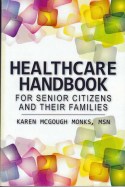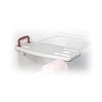 Source: Good Christmas suggestion for Senior Citizens & Their Families.
Source: Good Christmas suggestion for Senior Citizens & Their Families.
Good Christmas suggestion for Senior Citizens & Their Families.
Healthcare Handbook For Senior Citizens and Their Families Can now be purchased in paperback at amazon.com for under $10 Visit my website at
An Open Letter to Joy Behar
Source: An Open Letter to Joy Behar
What are good bathroom safety products for someone who had a hip replacement?
A bath bench, that extends over the side of the tub, is a good option, especially if you have lower limb weakness. It may not work if your tub/shower is enclosed by a sliding glass door. However, there are several shower chairs and benches to choose from. You might want to shop around for the best price.
I have seen some people use a light weight plastic chair, but I consider them too unsafe, because they are unstable.
No matter what type of chair, it is important that you have grab bars, securely installed in the shower/tub and by the toilet. Also, an elevated (riser) seat for the toilet will help keep you safe.
Usually someone who has had a hip replacement is eligible for a few home health visits by a therapist, who can evaluate the equipment and make suggestions for adaptations to keep you safe The therapist will also help you learn how to get in and out of the shower/tub without hurting yourself. Even if you received inpatient therapy after surgery, I always recommend a Home Health visit by a therapist. They can adapt their teaching based on the actual home situation.
Have copies of your medical directives for healthcare providers.
It is important that people give copies of their healthcare advanced directives to their healthcare providers and facilities, so their wishes can be honored. Such documents include DNR (do not resuscitate), DNI (do not intubate) and/or Power of Attorney.
Be sure to check my book, Healthcare Handbook for Senior Citizens and Their Families at: http://www.seniorhealthbook.com for more information about advanced directives.
What should I talk about with someone who is dying ? I am afraid that I may say the wrong thing.
In my book, Healthcare Handbook for Seniors and Their Families, I encourage Seniors to talk about their wishes when they are dying. I also encourage people to spend time with individuals who are dying. Everyone is so afraid that they will say the wrong thing. I have found that if you let them set the conversation, they will bring up the subject of their death, if they feel the need and sense that you are open to discussing the subject. One of the greatest fears of those who are dying is the fear of being isolated.
Reminiscence is a handy method that can be used. It helps them to review and evaluate their lives. The use of old photo albums can facilitate the process.
More information about my book can be found at my website
http://www.seniorhealthbook.com
Too Much Sitting Can Be Harmful To Your Health
Too Much Sitting Can Be Harmful To Your Health
How much Vitamin D is appropriate for a Senior?
This is a question that can be answered best by the primary care provider who treats the senior. The primary care provider can monitor the individual’s vitamin D blood levels and evaluate the individual’s need for vitamin D supplements.
There are many factors that affect the amount of vitamin D required by an individual. Some factors that affect vitamin D intake include where one lives, the time of year, how much vitamin D is contained in the daily diet, the health of the individual and their skin color. Obviously, people who live in northern cities during the wintertime are not able to depend upon sunshine for their daily source of vitamin D. The pigment in dark skin reduces the skin’s ability to produce adequate vitamin D. Kidney and digestive diseases can interfere with the body’s utilization of vitamin D.
The federal government recommends a daily intake of 600 IU of vitamin D for people over the age of 70. Some medical researchers believe that this recommendation is too low.
The largest source of vitamin D for many people is the regular sunlight exposure to the skin. Other sources include fish, egg yolks, and fortified milk, orange juice and cereals. Additionally, many people take daily supplements.
Adequate intake not only protects the bones, but research also indicates that there is lower risk for diabetes, heart disease, and cancer. On the other hand, there is a concern for too much daily intake of vitamin D. Overuse can lead to kidney stones, kidney damage, bleeding, or muscle weakness.
It is not surprising if you have run into so much conflicting information. In addition to the many factors involved with the use of vitamin D, there is quite a bit of research taking place, at this time, contributing to ongoing changes in recommendations.
MERRY CHRISTMAS, EVERYONE
Three Resources for someone needing Skilled Nursing Care
First, each state has an ombudsman program for long term care residents.The local ombudsman is a trained advocate for long term care residents in
their area. They can provide information about available long term care options in the area. They will, also, follow up on and try to resolve any complaints
submitted by residents or their representatives.
Second, Nursing Home Compare examines information about skilled nursing facilities in your area. The information is laid out in an easy to understand
manner. The staffing section identifies the various levels of staff and how many hours per resident per day is available at the facility. This data is based on
state inspections of the facilities. You can access this information at http://www.medicare.gov/NHcompare.
Third, each skilled nursing facility should have a resident/family council. Becoming involved in the facility’s council would help you become
aware of special issues concerning the facility and provide an avenue to foster improvements of care, if needed.
In addition to these three resources, don’t forget about your state’s Department of Health Services. They have a lot of useful information available on
their website and valuable contact information.



